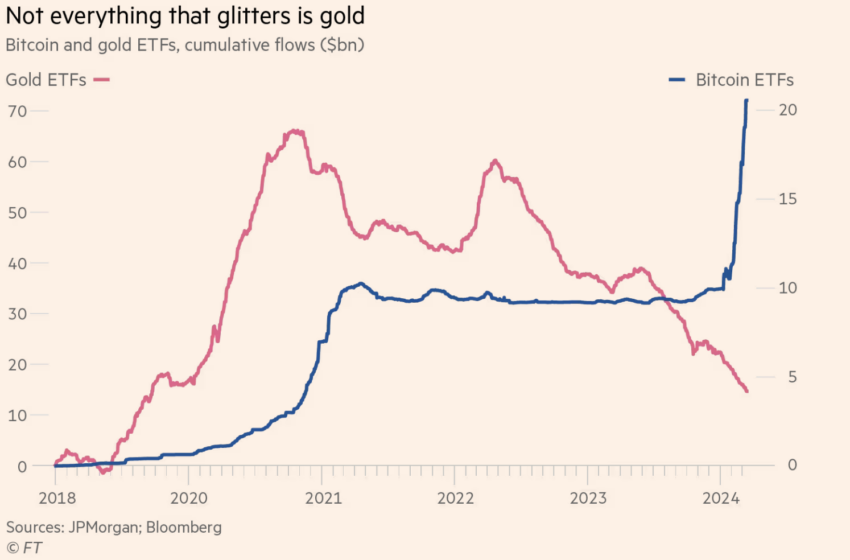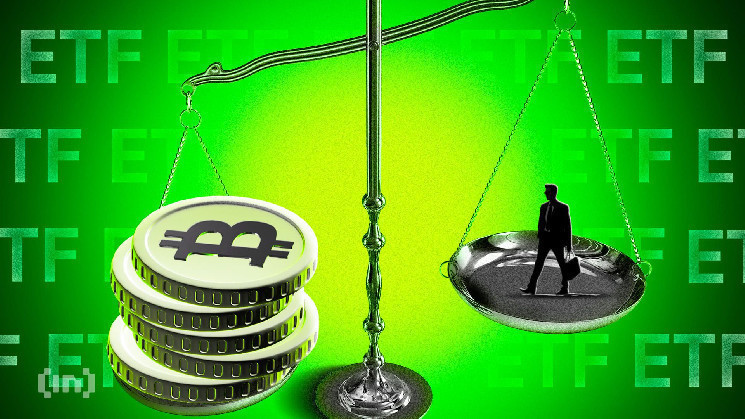Recent developments in the financial markets have sparked debate over whether investors are shifting their assets from gold exchange-traded funds (ETFs) to Bitcoin ETFs.
Despite the rapid growth of bitcoin ETFs in the US, research from investment banks suggests that the emergence of these digital asset funds has not significantly impacted gold ETF outflows.
How Bitcoin ETFs Are Not Causing Outflows in Gold ETFs
Bitcoin ETFs globally attracted $11.3 billion by March 21, even as the Grayscale Bitcoin ETF saw substantial outflows. Concurrently, gold ETFs experienced a $7.7 billion reduction, despite gold reaching a record $2,200 per ounce.
This led to speculation about a shift towards Bitcoin, often dubbed “digital gold.”
However, JPMorgan’s analysis challenges this view. It reveals that gold ETF outflows, starting in April 2022, predate the launch of US Bitcoin ETFs. These outflows have been consistent, indicating a trend not directly tied to Bitcoin ETF’s rise.
Read more: How To Trade a Bitcoin ETF: A Step-by-Step Approach

Furthermore, World Gold Council data shed light on the broader picture. Between September 2020 and December 2023, investors poured $229 billion into gold bars and coins.
Central banks added another $155 billion to their reserves. According to Nikolaos Panigirtzoglou from JPMorgan, this shows a shift in preference rather than a decline in gold’s appeal.
Interestingly, the appetite for Bitcoin as an alternative investment is growing, especially among the younger demographic. However, Bryan Armour from Morningstar and Nate Geraci from The ETF Store observe that the market link between gold and Bitcoin ETFs remains minimal for now.
“I’m sure there are a small contingent of investors who are shifting from gold to Bitcoin, but in reality I don’t think that outflows from gold correlate with the introduction of Bitcoin ETFs because any interaction between the two at the moment is limited and portfolios show that,” Armour said.
However during this week, even Bitcoin ETFs are experiencing net outflows. Farside Investors noted $836 million in total outflow from Bitcoin ETFs in the last four days, reflecting market volatility.
| Date | IBIT | FBTC | BITB | ARKB | BTCO | EZBC | BRRR | HODL | BTCW | GBTC | Total |
|---|---|---|---|---|---|---|---|---|---|---|---|
| 18 Mar 2024 | 451.5 | 5.9 | 17.6 | 2.7 | 0.0 | 0.0 | 4.8 | 5.7 | 0.0 | -642.5 | -154.3 |
| 19 Mar 2024 | 75.2 | 39.6 | 2.5 | 0.0 | 0.0 | 0.0 | 0.0 | 0.0 | 0.0 | -443.5 | -326.2 |
| 20 Mar 2024 | 49.3 | 12.9 | 18.6 | 23.3 | -10.2 | 19.0 | 2.9 | 9.3 | 0.0 | -386.6 | -261.5 |
| 21 Mar 2024 | 233.4 | 2.9 | 12.0 | 2.0 | 4.2 | 3.8 | 4.7 | 1.8 | 0.0 | -358.8 | -94.0 |
Despite these fluctuations, Bernstein and Standard Chartered have updated their Bitcoin outlook. Bernstein predicts a rise to $90,000 by year-end, citing strong market dynamics and ETF inflows.
Read more: Bitcoin Price Prediction 2024/2025/2030
Standard Chartered is even more optimistic, expecting Bitcoin to reach $150,000 by year-end and potentially $250,000 next year. These forecasts draw on the analogy with gold ETFs, suggesting a future where Bitcoin might mirror gold’s investment trajectory.
 beincrypto.com
beincrypto.com
